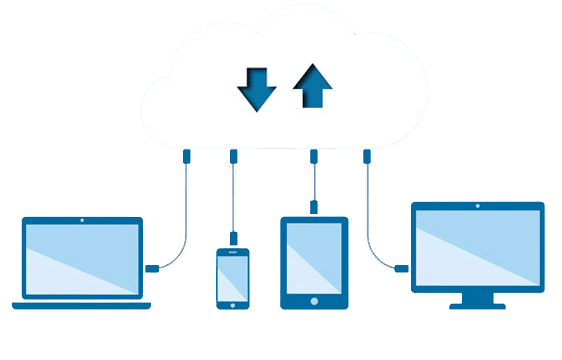There is a lot of talk these days of businesses being in the cloud, cloud ready or Cloud Migration Services.
However, if clouds and migration conjure up images of flocks of geese flying away as the seasons change, you’re probably not alone. Here at Imobisoft we pride ourselves on de-mystifying the tech world so that you can apply it to your business. After reading this through, you will be able to assess your business needs regarding cloud migration services.

“The cloud” refers to a group of servers and the databases, applications and software that run on those servers, which are accessed over the internet. Their geographic location could be anywhere in the world. These data centers are able to provide vast amounts of computing power and data storage more efficiently and at a lower cost.
So when you are browsing Netflix or scrolling through social media these are all services provided through cloud infrastructure. The largest providers of cloud services are Amazon Web Services (AWS), Microsoft’s Azure and Google Cloud Platform (GCP) but there are many other providers. So in a nutshell Cloud migration is the process of moving data or applications to a cloud computing environment, either from a local server/on-premise infrastructure or from another cloud platform.
Before we think about broader cloud migration services and the steps you might need to take, it’s good to understand why migrating to the cloud might be beneficial for your business. Cloud migration can offer many advantages and some of them will be unique to your business but here are a few of the common ones:
Flexibility
In the past when businesses invested in new server infrastructure, they would need to plan over a 3 – 5 year horizon. Servers were not cheap so when the investment was made they needed to ensure it would be fit for a reasonable period of time. So the server capacity was not based on current requirements but on what the future requirement might be based on market growth projections, market share analysis, new software plans etc. This means that many companies would have surplus server capacity that they did not need until a future date. However, with cloud computing you only have to pay for the resources you use, so there is no surplus capacity or over engineering of solutions for future events which may or may not happen.
Scalability
When your business is growing fast, being able to scale with agility is essential. Whether it is significant increases in web traffic or analysing growing amounts of data, not having enough storage or computational capacity can have significant impacts on any growth plans. By migrating to a cloud infrastructure you can have automated scalability that will expand resources as your business grows, meaning that you can spend your time where it is really needed, rather than worrying about IT infrastructure.
Security
The advanced security features available on cloud platforms is one of the key advantages of migrating to a cloud solution. The services are monitored 24/7 and security updates are applied on a continuous basis, ensuring that your data and infrastructure security is kept as upto date as possible. Data recovery can also be significantly improved by having mirror backups available at all times, as opposed to periodic backup of on premise servers which then come with significant restoration time frames.
Regulatory Compliance
Cloud migration can also be used to improve regulatory compliance. Increasingly legislation such as GDPR are enforcing geographical limited regulations which means your data collected in different jurisdictions may be subject to very differing legislation and breach of the regulations often incurs multi million pound fines. Cloud based solutions can ensure that your data is processed within the right geographical territories and can therefore have local compliance rules for processing.

As the last few years have shown the need for team members to be able to access files or data and log-in to software systems no matter where they are is no longer a nice to have. Remote access is now a business critical function. This has seen the rise and increased take up of software such as zoom and slack which are very good examples of cloud based technologies. In addition many companies that have migrated to the cloud have found that this enables remote access and sharing among staff in a more productivity enhancing manner.
Enabling Innovation
Using the type of cloud migration service which we provide can significantly improve the potential for innovation in your organisation. This can be through improving accessibility to data; allowing a swifter introduction to new infrastructure technologies such as headless servers or the ability to access machine learning and AI tools as part of the services provided by the likes of Azure, AWS and GPC.
Cost Savings
Cost savings are one of the reasons most often cited for a cloud migration project. However, it is important to understand where these cost savings might materialise from. The obvious one will be the reduced cost of expensive investment in on premise server hardware as well as the associated software license costs. In addition savings can also be achieved in reduced requirement for in house IT staff as much of the heavy lifting is done by the cloud hosting provider. When we embark on any cloud migration project with our clients, we help to prepare the business case by mapping out areas of potential cost savings.
Competitive Advantage
All of the above factors add up to a major competitive advantage over your competitors who are still dealing with legacy on premise infrastructure. However, if your competitors have already transitioned to the cloud or are currently entering into a cloud migration project you may find that your business is quickly left behind.
 How do I migrate to the cloud?
How do I migrate to the cloud?Transitioning to the cloud should not be seen as a stand-alone exercise but should be implemented as part of a broader digital strategy or digital transformation. We help businesses first assess where they currently are in their cloud migration journey.
Most businesses are already in a hybrid position, as many of today’s software applications are developed as SaaS (software as a service) products and are naturally hosted on cloud platforms. This includes popular CRM systems such as Zoho, Hubspot or Salesforce and accounting software such as Xero or Quickbooks.
For some organisations, a “lift and shift” approach is appropriate, where all applications and data are moved to a new environment in one go. This works well where the existing legacy applications have cloud versions available and data exists in relatively simple structures.
For other organisations, the cloud migration will be a more planned and phased rollout. Some legacy systems may either need new API’s built to function in a cloud environment or the business may want to build bespoke applications in the new environment. Read more about our Bespoke Business Applications.
In addition, if the business has complex data structures, we often see this as a great opportunity to help businesses plan their data structures to be more efficient in the cloud environment so as to ensure that the maximum benefit can be realised when moving to the cloud.
Mapping your existing application and data environment is crucial to the overall success of your cloud migration project.
 Our Cloud Migration Services
Our Cloud Migration ServicesOur cloud migration services fall into four areas;
Cloud migration analysis
We take a deep dive into your existing data and application structures, we help you map out the relationships between your existing data flows and applications. We then breakdown the inefficiencies of the existing structure and help you create a cloud-first approach to your business.
At the end of this stage, you will have a clearly defined view of your requirements for your cloud environment and what the outcome should look like. At this stage, we can also help prepare a business case to ensure that the project has the correct KPI’s assigned from the start.
Cloud migration planning
We help you assess the best cloud platform (or mix of cloud platforms) for your requirements. We then provide a road map based on the analysis stage, which will identify the order of transition of services.
Cloud migration implementation
We work with your team and any 3rd party vendors to transition your data and applications based on the road map, building new API’s as required and implementing the agreed new security structures from day one.
Cloud monitoring & optimisation
Once your new cloud infrastructure is in place and your applications and data have been successfully migrated, we provide ongoing support to ensure that you gain the maximum benefits on an ongoing basis.
If you would like a further chat on this we work with clients to help them successfully migrate and optimise their businesses into cloud environments, helping them to gain a competitive advantage.
TRUSTED BY SOME OF THE WORLD’S BEST TEAMS








Connect with our experts to promptly get an intelligent extension of your in-house team
Let’s chat about how we can help you. Fill in the details and we’ll get back to you as soon we can.